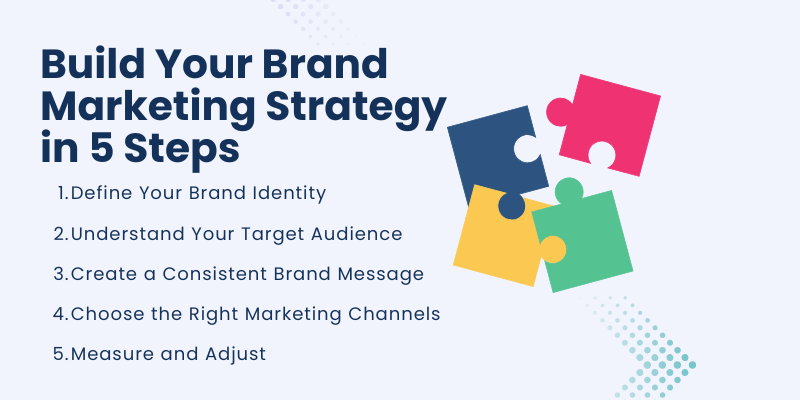So, exactly what is brand marketing? At its core, brand marketing is all about creating and nurturing a strong identity for your company or product.
Unlike traditional marketing, which focuses mainly on selling, brand marketing aims to establish a unique image that connects with consumers on a deeper, emotional level.
It’s about telling your story in a way that resonates, developing a personality that feels authentic, and delivering a consistent message that people can trust and relate to.
The goal is to make your brand stand out in a way that’s memorable, something that goes beyond just the products or services you offer.
Many businesses combine brand strategies with Integrated Marketing approaches to ensure consistency across all customer touchpoints.
Brand marketing works by positioning your company in the minds of consumers, aligning your values and identity with what your audience expects and wants.
It’s not just about influencing buying decisions; it’s about building loyalty and turning customers into advocates. Also, it is about how you stand out in a crowded market, get noticed, and keep your customers coming back for more.
In this blog, we dive into how a strong brand identity can take your business to the next level.
What is Brand Marketing?
Brand marketing is all about creating and nurturing a relationship between a brand and its consumers. Instead of focusing on promoting individual products or services, brand marketing emphasizes the entire brand, using its offerings as evidence that supports the brand's core promise.

The channels used for brand marketing are the same ones used for product marketing, digital, social media, and paid search ads. A solid strategy involves combining these different channels to form a media mix that reaches a broad audience. For instance, businesses may use Digital marketing services to enhance visibility and engagement while maintaining consistent brand storytelling.
For example, brand marketers may use a brand advertising strategy, combined with email and content marketing, to increase brand awareness and engage potential customers across various digital platforms.
But to effectively craft the right messages for the right audiences, it's essential to first understand the brand’s key attributes.
What are Brand Attributes?
Just as people have their own unique personality traits, brands have distinct attributes that define them. These attributes are identifiers that consumers associate with a brand.
They can include elements like the brand’s name, tagline, colors, and even sounds or music linked to the brand. Beyond these visual and auditory markers, brand attributes also encompass the feelings a brand evokes.
Developing these elements should follow clear branding guidelines to maintain consistency and authenticity across every platform.
For example, a brand might be seen as authentic, innovative, dependable, honest, or transparent.
Explore Our Digital Marketing Services!
5 Key Elements of Brand Marketing
Brand marketing is built on three fundamental components that collectively shape a brand’s presence and its connection with customers.

These elements are essential in creating a strong, recognizable, and trusted brand.
- Brand Identity
- Brand Positioning
- Brand Consistency
- Brand Messaging
- Brand Engagement
Let’s explore each
1. Brand Identity
Brand identity is the visual and emotional representation of a brand. It includes the brand’s logo, color palette, typography, and overall design, which together communicate the brand's personality and values to its audience.
A well-defined brand identity creates an immediate, lasting impression and differentiates the brand from its competitors. Companies like Centric specialize in helping businesses craft distinctive identities that truly connect with their target audience.
2. Brand Positioning
Brand positioning is the strategy used to establish a brand’s unique place in the market. It defines how the brand is perceived relative to its competitors and highlights its unique value proposition.
Effective brand positioning ensures that the brand resonates with its target audience, addressing their needs, desires, and pain points in a way that sets it apart from others in the marketplace.
3. Brand Consistency
Brand consistency ensures that all marketing materials, messaging, and interactions remain uniform across all touchpoints.
Whether it's advertising, social media, customer service, or product packaging, maintaining consistency in tone, visuals, and messaging helps build recognition and trust.
Consistency is key to reinforcing the brand’s identity and maintaining a strong, unified presence in the market.
4. Brand Messaging
Brand messaging is the foundation of how a company communicates with its audience. It involves crafting key messages that clearly convey the brand’s values, purpose, and the benefits it offers.
This messaging defines what the brand stands for and why it matters to the consumer. Effective brand messaging resonates with the target audience, addressing their needs and desires while creating an emotional connection.
Marketers often use content marketing tools to streamline this process, ensuring consistent and effective message delivery across channels.
5. Brand Engagement
Brand engagement focuses on building meaningful, long-lasting relationships with customers. It goes beyond one-time interactions, fostering continuous communication and involvement with the brand.
This is achieved through active engagement on social media, sharing valuable content, and offering exceptional customer service.
By creating opportunities for customers to interact with the brand in a genuine and personalized way, businesses can deepen loyalty, increase customer satisfaction, and enhance the overall brand experience.
Explore Our Creative Branding Services!
How to Market a Brand: Build Your Brand Marketing Strategy in 5 Steps
A brand marketing strategy as a guide to organize your efforts and educate consumers about your brand. To achieve measurable impact, it’s essential to understand Brand Marketing vs Performance Marketing, balancing long-term brand building with short-term results that drive conversions.

Here’s how to build your brand marketing strategy in five simple steps:
1. Define Your Brand Identity
The first step in building a brand marketing strategy is defining your brand identity. This includes understanding your brand’s mission, values, and the unique personality you want to project.
Ask yourself: What do you want your customers to feel when they engage with your brand? Establishing a strong identity will guide your marketing efforts and make your brand instantly recognizable.
2. Understand Your Target Audience
Knowing your audience is key to creating a successful brand marketing strategy. Research your ideal customers, their needs, preferences, challenges, and where they spend their time.
By understanding who your audience is, you can craft messaging that resonates with them and meets their expectations.
Applying Inbound Marketing principles helps attract these customers organically by offering them genuine value and relevant content.
3. Create a Consistent Brand Message
Consistency is crucial in brand marketing. Develop a clear, consistent message that communicates who you are, what you offer, and why it matters.
This message should be reflected across all marketing channels, including your website, social media, advertising, and content. The goal is to ensure that customers immediately recognize your brand and understand what it stands for.
4. Choose the Right Marketing Channels
With so many marketing channels available, it’s essential to select the ones that best reach your audience. Digital, social media, content marketing, and paid advertising are all popular choices.
A good brand marketing strategy combines different channels to create a well-rounded media mix that maximizes exposure. Make sure to use platforms that align with your target audience’s habits and preferences.
5. Measure and Adjust
The final step is to continuously measure the performance of your brand marketing efforts. Use analytics tools to track brand awareness, engagement, and customer sentiment. Pay attention to what’s working and where improvements can be made.
Adjust your strategy accordingly to ensure that your brand continues to grow and stay relevant to your audience.
5 New Trends & Development in Brand Marketing
As we move through 2025, several key branding trends are shaping how businesses connect with consumers. Here's an overview of the most impactful developments:
1. Generative AI & Hyper-Personalization
Artificial intelligence continues to revolutionize branding by enabling brands to deliver highly personalized experiences.
Tools powered by AI can analyze vast amounts of data to predict consumer preferences, allowing for tailored content and product recommendations. This level of personalization enhances customer engagement and fosters stronger brand loyalty.
2. Community-Driven Brand Building
With the rise of decentralized platforms, brands are shifting focus towards building authentic communities. Platforms like Bluesky and Kindr are gaining traction as consumers seek more meaningful connections.
Brands are leveraging these platforms to engage directly with their audience, fostering a sense of belonging and trust.
3. Sustainability as a Core Brand Value
Consumers are increasingly prioritizing environmental and social responsibility when making purchasing decisions.
Brands that demonstrate a genuine commitment to sustainability through transparent practices and eco-friendly products are gaining favor.
4. Immersive Experiences via AR & VR
Augmented Reality (AR) and Virtual Reality (VR) are transforming how consumers interact with brands. These technologies offer immersive experiences, allowing customers to visualize products in real-world settings or engage with virtual environments.
Brands are utilizing AR and VR to enhance storytelling and create memorable interactions
5. Influencer Partnerships & Creator Collaborations
Influencer marketing remains a powerful tool for brand promotion. Collaborations with influencers and creators enable brands to reach targeted audiences authentically.
Platforms like TikTok and Instagram continue to be pivotal in facilitating these partnerships, driving engagement and brand awareness.
Partnering with agencies that offer Creative Campaign Services can help brands develop innovative influencer strategies that stand out in a crowded digital landscape.
By embracing these trends, brands can stay ahead of the curve, fostering deeper connections with their audience and ensuring sustained growth in a competitive market.
Conclusion
Brand marketing is a strategic effort aimed at shaping perceptions, influencing purchasing decisions, and driving long-term growth for a business. It focuses on building a strong, recognizable brand identity that resonates with consumers, fosters trust, and encourages loyalty. By creating a unique brand identity, delivering consistent messaging, and engaging customers on an emotional level, brand marketing helps establish trust and recognition in the market. Moreover, it plays a vital role in differentiating a brand from its competitors and ensuring it remains top-of-mind for consumers. Partnering with professionals who provide Product Launch & Execution Services ensures smooth rollouts that align perfectly with the brand’s strategy and positioning. Thus, effective brand marketing not only fosters loyalty and advocacy but also contributes to sustained business success by aligning the brand with the values and needs of its target audience.








